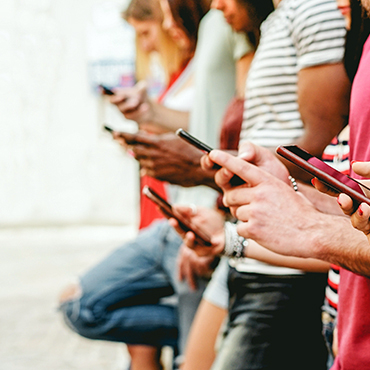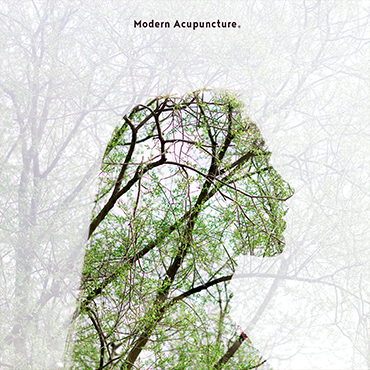Acupuncture is One Pathway to Improved Mental Health in Adolescents

In the best of times, adolescence is a period of difficult transition and maturation toward adulthood.1 A stressor, such as the COVID-19 pandemic, may amplify aspects of this journey, negatively impacting mental health. Teens have been affected by the abrupt withdrawal from school, social life, and outdoor activities due to the COVID-19 pandemic.2 Some experienced new or increased domestic violence.
Social isolation and loneliness, changes in diet and physical activity, increased internet activity, and other effects of the pandemic restrictions can stimulate the release of chemicals from the brain.3 Activation of neurotransmitters, neuromodulators, hormones, pro-inflammatory cytokines, and other biochemicals increase the risk for a wide range of short-term as well as longer-term effects and disorders.3,4
Effects of COVID-19 Pandemic Restrictions Can Produce Short- and Long-term Adverse Effects3,4
Immediate/Short-Term Behavioral and Social Effects
- Distress, hopelessness
- Irregular eating
- Abuse, trauma
- Interpersonal, environmental restraint
- Sensorial deprivation, neglect
Possible Longer-Term Effects
- Underdeveloped brain circuitry
- Obesity
- Substance use
- Lack of emotional processing
- Psychiatric/psychological disorders
- Suicidal thoughts
- Depression, anxiety, post-traumatic stress disorder, obsessive-compulsive disorder, others
The impact of COVID-19 on the mental health of teens might be reflected by recently reported study findings showing the proportion of hospital presentations of pediatric patients with mental health disorders increased compared with the earlier year4: suicidal ideation/suicide attempts (60.3% vs 49.7%), depression (70.4% vs 63.4%), anxiety (50.5% vs 46.0%), and obsessive compulsive and related disorders (3.0% vs 1.8%).
Hospital admissions for eating disorders doubled, from 6.9% to 13.8%, while those for substance-related disorders increased by nearly 50% (9.2% vs 6.7%). Results of other studies support these effects of the Pandemic5-8 Further, decline in mental health in teens can lead to engagement in unhealthy behaviors.6-8
Rates of depressive symptoms in young people during the pandemic ranged from 22.6% to 43.7% (nearly 1 in 2) and of anxiety from 18.9% to 37.4% (more than 1 in 3).9
Role of Acupuncture for Mental Health in Teens
The increase in the prevalence of mental health and related disorders during the COVID-19 pandemic and risk for further negative effects underscore the need for effective remedies. The first step is recognition that a teen might be experiencing a mental health problem. Watching for the signs and symptoms of depression and anxiety, as examples, might assist parents/caregivers, teachers, and others involved in the teen’s life identify a problem early (see list of Signs and Symptoms of Depression and Anxiety below).10,11
Acupuncture can be an effective non-medication (vs pharmacotherapy), non-verbal (vs psychotherapy) therapeutic option for mental health problems in teens.
Treatment discontinuation and failure of standard therapy, pharmacotherapy and psychotherapy, are common.12 A review of studies showed that complementary and alternative medicine therapies, including acupuncture, significantly improved symptoms of depression and anxiety, as well as positively impacted stress, sleep quality, negative emotions, and quality of life in COVID-19 patients.13
Generally, there is strong scientific evidence supporting the use of acupuncture as an effective treatment for anxiety disorders, with fewer side effects than those occurring with conventional treatment.14 Similarly, acupuncture, added to antidepressants or as a single treatment can positively affect depressive symptoms.15-17 Compared with antidepressants, acupuncture has the advantages of fast onset and long-term efficacy in the treatment of depression. Additionally, acupuncture avoids the side effects associated with medications. Most teens and children receiving acupuncture have no issues with “needling” and report benefits of the therapy.18
By restoring the internal environment of a person’s body, acupuncture can go a long way in helping to reduce or eliminate many symptoms related to mental health issues19
The impact of the COVID-19 pandemic on teens, coupled with an already recognized difficult period of life, mandates screening for mental health problems, especially in those at increased risk, and devising and implementing a management plan. Acupuncture, which has been shown to treat several mental health disorders and related consequences effectively, offers a safe and well-tolerated option.
Signs and Symptoms of Depression and Anxiety that can Cause Significant Distress at Home and School10,11
Depression10
Emotional Changes
- Feelings of sadness, which can include crying spells for no apparent reason
- Frustration or feelings of anger, even over small matters
- Feeling hopeless or empty
- Irritable or annoyed mood
- Loss of interest or pleasure in usual activities
- Loss of interest in, or conflict with, family and friends
- Low self-esteem
- Feelings of worthlessness or guilt
- Fixation on past failures or exaggerated self-blame or self-criticism
- Extreme sensitivity to rejection or failure, and the need for excessive reassurance
- Trouble thinking, concentrating, making decisions, and remembering things
- Ongoing sense that life and the future are grim and bleak
- Frequent thoughts of death, dying or suicide
Behavioral Changes
- Tiredness and loss of energy
- Insomnia or sleeping too much
- Changes in appetite — decreased appetite and weight loss, or increased cravings for food and weight gain
- Use of alcohol or drugs
- Agitation or restlessness — for example, pacing, hand-wringing or an inability to sit still
- Slowed thinking, speaking or body movements
- Frequent complaints of unexplained body aches and headaches, which may include frequent visits to the school nurse
- Social isolation
- Poor school performance or frequent absences from school
- Less attention to personal hygiene or appearance
- Angry outbursts, disruptive or risky behavior, or other acting-out behaviors
- Self-harm — for example, cutting or burning
- Making a suicide plan or attempting suicide
Anxiety11
Emotional and Behavioral
- Restlessness, agitation, tension
- Sensitivity to criticism or extreme discomfortable in social situations
- Worry too much about a situation; always expecting the worst to happen
- Avoidance of new and challenging situations
- Isolation or avoidance of social activities
- Difficulty controlling obsessive thoughts
- Obsessive-compulsive behavior
Physical
- Sore or tense muscles
- Urge to urinate frequently
- Chest pain, racing heart, headaches, sweating, stomach aches, dry mouth, and abdominal pain
- Trouble sleeping
Mental
- Trouble focusing
- Easily distracted
- Forgetfulness
- Difficulty in completing a task, especially a school homework
References
- Guessoum B, Lachal J, Radjack R, et al. Adolescent psychiatric disorders during the COVID-19 pandemic and lockdown. Psychiatr Res. 2020;19:113264.
- Singh S, R D, Sinha K, Parveen S, Sharma G, Joshi G. Impact of COVID-19 and lockdown on mental health of children and adolescents: a narrative review with recommendations. Psychiatr Res. 2020;293:113429.
- Figueiredo CS, CapuchoSandre P, LimaPortugal LC, et al. COVID-19 pandemic impact on children and adolescents’mental health: biological, environmental, and social factors. Prog Neuro-Psychopharm Biol Psychiatr. 2021;106:2110171.
- Ibeziako, Kaufman K, Scheer KN, Sideridis G. Pediatric mental health presentations and boarding: first year of the COVID-19 pandemic. Hosp Pediatr. 2022;11(8);doi: 10.1542/hpeds.2022-006555.
- Loades ME, Chatburn E, Higson-Sweeney N, et al. Rapid Systematic Review: The impact of social isolation and loneliness on the mental health of children and adolescents in the context of COVID-19. J Am Acad Child Adolesc Psychiatr. 2020;59(11):1218–1239.
- Meherali S, Punjani N, Louie-Poon S, et al. Mental health of children and adolescents amidst COVID-19 and past pandemics: a rapid systematic review. Int J Environ Res Pub Health. 2021;18:3432. doi.org/10.3390/ijerph18073432.
- Jones EAK, Mitra AK, Bhuiyan AR. Impact of COVID-19 on mental health in adolescents: a systematic review. Int J Environ Res Pub Health. 2021;18:2470. doi.org/10.3390/ijerph18052470.
- Meade J. Mental health effects of the COVID-19 pandemic on children and adolescents: a review of the current research. Pediatr Clin N Am. 2021;68:945–959.
- Nearchou F, Flinn C, Niland R, Subramanian SS, Hennessy E. Exploring the impact of COVID-19 on mental health outcomes in children and adolescents: a systematic review. Int J Environ Res Pub Health. 2020;17:8479-8498. doi:10.3390/ijerph17228479.
- Teen Depression. Mayo Clinic. May 3, 2022. www.mayoclinic.org/diseases-conditions/teen-depression/symptoms-causes/syc-20350985.
- Gongala S. Reviewed by Dr Claudia M. Gold. Causes of Anxiety in Teens, Types, Symptoms and Treatment. April 22, 2022. www.momjunction.com/articles/anxiety-in-teens_00484975/#symptoms-of-anxiety-in-teenagers.
- Asher GN, Gerkin J, Gaynes B> Complementary therapies for mental health disorders. Med Clin North Am. 2017;101(5):847-864.
- Badakhsh M, Dastras M, Sarchahi Z, Doostkai M, Mir A, Bouya S. Complementary and alternative medicine therapies and COVID-19: a systematic review. Rev Environ Health. 2021;36(3):443-450.
- Amorim D, Amado J, Brito I, et al. Acupuncture and electroacupuncture for anxiety disorders: a systematic review of the clinical research. Complement Ther Clin Pract. 2018;31:31-37.
- Zhang Z, Li S, Meng H, et al. Efficacy and safety of acupuncture in the treatment of depression: a systematic review of clinical research. Anat Rec (Hoboken). 2021;304(11):2436-2453.
- Smith CA, Armour M, Lee MS, Wang LQ, Hay PJ. Acupuncture for depression. Cochrane Database Syst Rev. 2018;3:CD004046.
- Armour M, Smith CA, Wang LQ, et al. Acupuncture for depression: a systematic review and meta-analysis. J Clin Med. Jul 2019;8(8). doi:10.3390/jcm8081140.
- Kemper K, Sarah R, Silber-Highfield E, Xiarhos E, Barnes L, Berde C. On pins and needles? Pediatric pain patients experience with acupuncture. Pediatrics April 2000;105(4):941-947.
- Grande A. Mental health benefits of acupuncture. www.focusphysiotherapy.com/mental-health-benefits-acupuncture/.
[Back to main news page]



